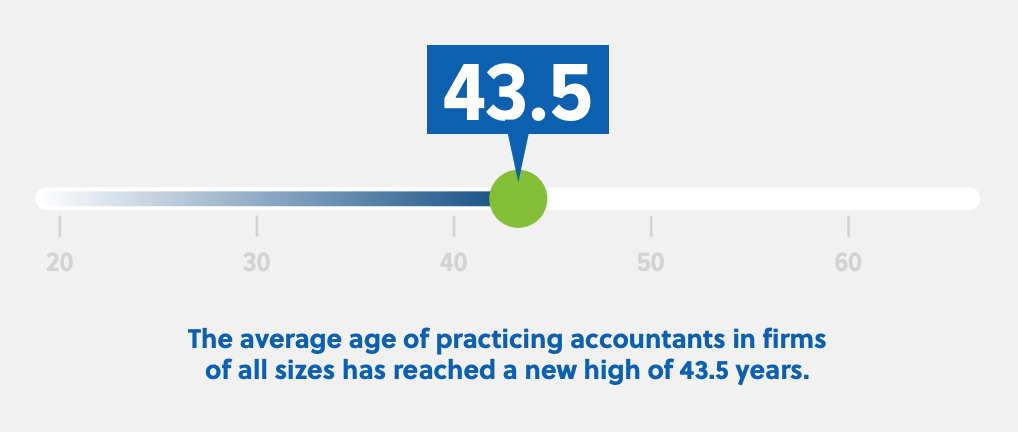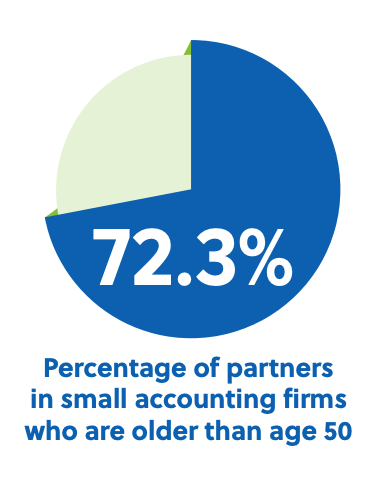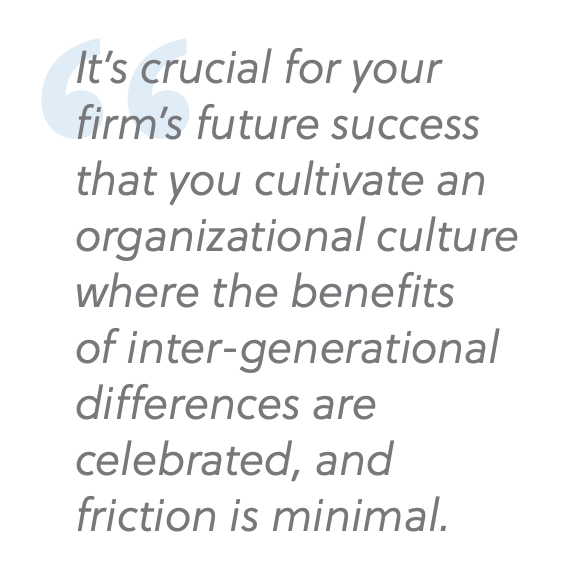Americans are living — and working — longer than they have at any time in the past.(COVID-19’s negative impact on the average U.S. lifespan is expected to be only temporary.). It’s therefore no surprise that the percentage of partners in small accounting firms who are older than age 50 has never been greater.
The age of accounting
According to the CPA Journal’s 2020 Practice Management Survey, this number is now at 72.3%. What’s more, the average age of practicing accountants in firms of all sizes is increasing as well. U.S. Census Bureau data shows that it has reached a new high of 43.5 years.

Even as the average accountant is growing older, more Millennials are entering the accounting profession than any other demographic cohort. But these younger people are less likely to be interested in majoring in accounting in college or pursuing a career in the field post-graduation than previous generations. This fact helps to explain the serious and worsening talent shortage that the accounting profession now faces.
 Accounting and finance positions have been listed among the 10 hardest-to-fill jobs in Manpower’s Annual Talent Shortage survey for the last four years running.
Accounting and finance positions have been listed among the 10 hardest-to-fill jobs in Manpower’s Annual Talent Shortage survey for the last four years running.
Accounting firms that want to prosper in the years to come must position themselves as flexible, innovative workplaces in order to attract scarce Millennial and Gen Z accounting talent. But, they must also make the most of their older employees’ skills to maximize the value these highly experienced professionals can contribute to the overall success of the firm. To accomplish both of these objectives, firms must build inclusive cultures and facilitate communication among their employees, of course. But they will also need the right technology strategy
Don’t fall into the generation gap
Young people are thought to think differently than their parents or grandparents. A generation gap is this perceived difference in opinions, values, attitudes and beliefs between one generation and another. This includes aptitudes for and attitudes toward technology use. But the differences in question go far beyond that.
It’s crucial for your firm’s future success that you cultivate an organizational culture where the benefits of inter-generational differences are celebrated, and friction is minimal.
The first and most important step toward achieving a positive company culture involves banishing stereotypes from your workplace. This is important for creating an inclusive and tolerant environment and combating ageism within the company. Your firm’s leadership may need to take deliberate steps to fight subtle or unconscious discriminatory attitudes, including implementing formal programs to ensure diversity is valued within the organization.
The belief that young people have an easier time adapting to technological change than older ones is also particularly widespread. In fact, though nearly all Gen Z-ers are digital natives, not all are equally quick to pick up on the ins and outs of a new software solution. And, not all seniors are technophobes. It’s vital that accountants see their colleagues as the individuals they are rather than falling back on stereotypes about people’s proficiency with technology.
Training has the power to level many of these differences, too. When implementing new technologies in your firm, make sure you’re also teaching employees to use them in ways that are individualized, so that you can take each employee’s preferences and learning style into account.
Facilitate communication when it comes to software
In order for teams to work efficiently within accounting firms, it’s key to make sure everyone is on the same page. Technologies, such as OfficeTools practice management software, can help you standardize your processes, track communication with the firm’s clients and integrate with other calendar, time tracking and invoicing tools. These solutions are fairly intuitive to learn, even for individuals who aren’t especially tech-savvy.
 When selecting software for your multi-generational accounting firm, ease-of-use is very important. If all employees can quickly become proficient at using a solution, this will encourage them to collaborate on tasks and projects. Having shared technology solutions will also make it easier for people to keep work-related lines of communication open.
When selecting software for your multi-generational accounting firm, ease-of-use is very important. If all employees can quickly become proficient at using a solution, this will encourage them to collaborate on tasks and projects. Having shared technology solutions will also make it easier for people to keep work-related lines of communication open.
It’s also important that your firm supports a variety of communication channels, including collaboration tools and email, as well as an accounting practice management platform that supports messaging. This way employees can naturally gravitate towards the communication channels that feel most comfortable to them. Making it easier to share information will benefit everyone’s productivity, regardless of the ages of your firm’s staff.
Rethink company culture
Different generational cohorts do in fact tend to have different values. Millennials, for instance, tend to consider work-life balance a high priority. In contrast, Baby Boomers are more concerned about remuneration.
On the one hand, your firm should strive to be an open and inclusive place that’s ready to welcome a diverse group of younger employees into the fold. On the other, you need to be able to take advantage of the skills that your more senior employees have. These individuals have likely spent decades performing an array of accounting and tax preparation tasks manually, and have deep knowledge — and a hands-on understanding — of how the profession got to be where it is today. It’s essential to balance the opportunities and benefits you offer so that members of both groups feel valued in your firm.
The talent shortage that the accounting profession currently faces is likely to persist into the foreseeable future. To overcome the challenges that it poses, and to ensure that generational differences are a source of value rather than conflict for your firm, you’ll need to build a welcoming and inclusive organizational culture. The right technologies — coupled with individualized training — can provide an invaluable bridge across the generation gap.
Learn how to measure intangibles >>
<< Back to building a better practice